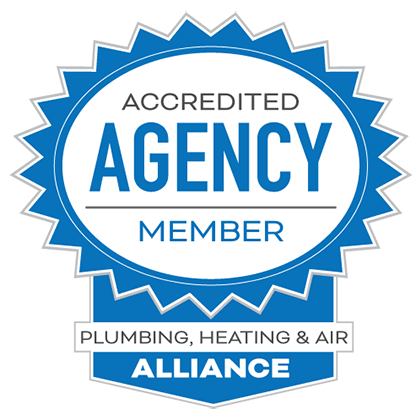SEO for plumbers can greatly impact your business growth, lead generation, and revenue.
The formula I outline below has been used on over 1,000 SEO campaigns for professional plumbing companies over the past 14+ years.
The formula reveals:
- Why plumbers need SEO
- Terms and phrases customers use to find plumbers online
- What type of content drives leads
- The difference between Local SEO and regular SEO
- Which software plumbers are using to boost SEO
- How AI Overviews impacts SEO for plumbers
- How to identify SEO misinformation
And much more – all based on 14+ years of first-hand experience as the founder, owner, and operator of Plumbing Webmasters.
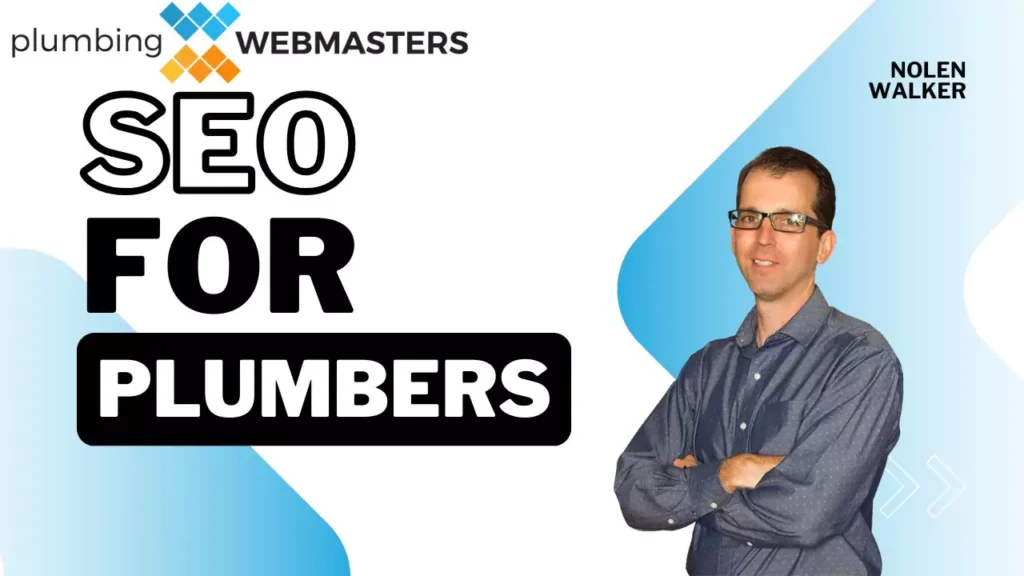
Why Plumbers Need SEO
People search for plumbing and plumber-related queries 11,271,710 per month.

This ongoing demand for plumbing services creates a valuable lead source for service providers.
While SEO won’t replace every aspect of your marketing campaign, it will enhance other promotional endeavors, like branding, advertising, and word-of-mouth referrals.
And what separates SEO is that it works non-stop every minute of every day.
What is SEO for Plumbers?
SEO for plumbers is the action of creating and editing website pages (or business listings) to rank for relevant search terms on Google and other search engines.
In other SEO guides, all search terms are called “keywords.”
I have a different mindset for this part of the process because not all search terms are actually “keywords.”
In fact, my 14+ years of SEO campaign data reveal that over 50% of all organic website clicks come from search terms that do NOT register search volume on third-party keyword research tools like Ahrefs and Semrush.
As a plumber, you can relate to this, as each of your customers talks a little bit differently.
That’s also how they search on Google.
One customer might search for “no hot water low water pressure fort worth” while another might search for “plumber near me for rheem water heater.”
An effective SEO formula accounts for all of these terms and phrases to capture all your potential customers.
Google Ranking Factors
There are seven confirmed ranking factors which are:
- Backlinks
- User Intent
- Freshness (update frequency)
- HTTPS (secure website)
- Mobile Experience
- Page Speed
- Intrusive interstitials
Most Google ranking factors are unconfirmed, but we are sure there are at least 200.
The tricky part is that these factors are weighted, and their weights can shift up to 12 times per day.
In some cases, factors are removed from the algorithm and replaced with new ones.
Since none of these changes are made public (aside from some non-specific guidance), plumbers often invest in professional SEO services to help them navigate the murkiness.
While outsourcing SEO to an expert makes sense, you should still understand how SEO works to make the best decisions for your plumbing business in the future.
How Consumers Find Plumbers on Google
Consumers enter a term or phrase into Google and click “search,” which prompts the search engine to deliver a series of results, including business listings and website links.
The study of which terms and phrases your target customers are searching for is called keyword research.
There is only one problem: over half of these terms and phrases are “hidden” from keyword research tools like Semrush and Ahrefs and don’t appear within your Google Search Console data.
That’s where most SEO guides lead plumbers astray, as focusing strictly on “keywords” will cost you more than half of your prospective clients.
Foundation Keywords
While tools like Ahrefs and Semruh don’t capture all of your customers’ queries, they are still valuable in identifying what I call foundation keywords.
Foundation keywords are usually straightforward terms or phrases, such as plumber, plumber near me, plumbing repair, etc., that combine the city or location.
For most companies, they look something like this:
- Plumbing dallas
- Plumber houston
- Plumbing miami
- Plumber seattle
- Plumbing fort worth
You can look up the estimated search volume of your target keyword using Semrush.
Enter plumbing + (your city name) into Semrush and sort by volume.
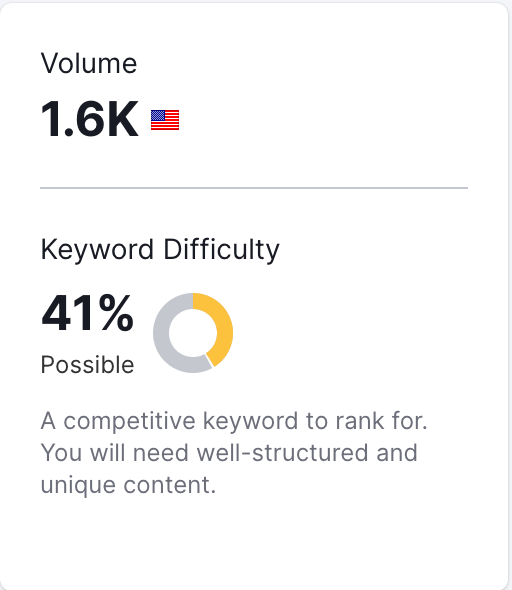
Examples of other foundation keywords include:
- Plumbing repair dallas
- Plumbing company houston
- Plumbing maintenance miami
- Plumbing inspection seattle
- Plumbing replacement fort worth
Specialty Keywords
Prospective customers with a specific plumbing-related need will use more granular terms in their searches.
As a plumbing company, your services vary by location, resources, and demand.
For instance, some plumbers focus strictly on drain cleaning or water heater repair, while more traditional companies offer a range of services from leak detection to pipe repair.
The uniqueness of your services is where specialty keywords emerge.
The first step is to list each service your company offers manually:
- Residential Plumbing
- Commercial Plumbing
- Emergency Plumbing
- Drain Cleaning
- Sewer Line Repair
- Water Heater Installation
- Leak Detection
- Pipe Repair
- Hydro Jetting
Next, use Semrush to measure the volume of your specialty keywords.
In this case, you DO NOT want to include the location in your keyword.
Semrush is a feature that allows you to “select location,” which provides an estimate of that term in your city.

You should not rely solely on this number. You should also monitor the national volume for the term, which can better indicate its popularity.
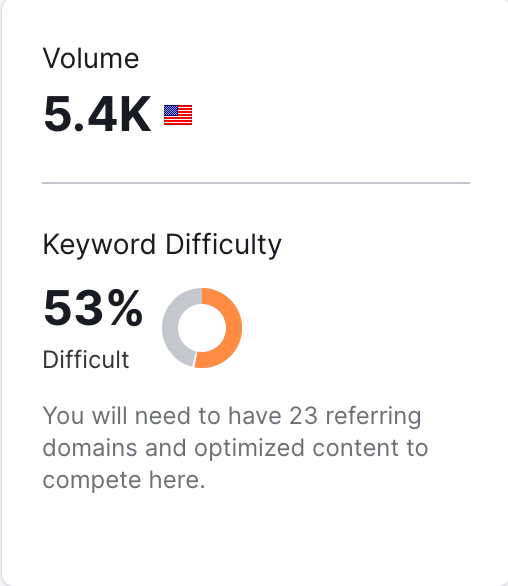
Another factor to consider is your city’s estimated population, as it will also help you determine how valuable a given keyword is in your location.
For instance, the phrase “sewer line repair” shows the following numbers:
- National volume: 5,400
- Local volume: 140
- Local population: 500,000
Combined, these numbers make it clear that sewer line repair is a high-opportunity keyword for a Dallas-based plumbing company.
Hidden Keywords
Although you can’t research hidden terms on keyword research tools, you still must account for them in your SEO strategy.
Hidden terms account for over half of all your organic website visitors.
You might wonder how I know this.
I compiled a comprehensive research case study based on 1,000+ SEO campaigns using Google Search Console data.
Other studies on this matter, like one conducted by Ahrefs, have reached similar conclusions.
Generally, hidden terms are three words or longer, sometimes called long-tail queries.
Examples of long-tail queries are:
- emergency drain cleaning service round rock
- rinnai tankless water heater installation san antonio
- residential trenchless sewer repair burbank
As much credit as the SEO industry gives to tools like Ahrefs, Semrush, and Google Search Console, none of these tools will capture hidden terms.
You can corroborate this yourself by entering one into Semrush.
The tool will display “N/A” as the search volume.
So, how do you account for these terms?
One way is to utilize job data from your field management app, such as ServiceTitan, Housecall Pro, or Jobber.
When used properly, these apps store your job history, which you can transfer to a Google Sheets spreadsheet to find trends related to potential hidden terms.
If you seek a more SEO-specific solution, you can use DataPins, NearbyNow, or GeoJuice to directly tag your recent plumbing jobs (and their locations) on your website.
SEO Content for Plumbers That Drives Leads
For keywords to rank on Google search, you must create content that targets them.
However, ranking on Google is not your only objective when creating content; it is also to drive leads.
Many plumbers create hundreds or even thousands of blog posts on their websites, thinking that “content is king.”
This strategy usually backfires and is not part of my SEO formula for plumbing companies.
Google will choose not to index most of these posts, and the others will dilute the sitewide quality of your content.
My strategy differs because I focus on helping plumbing companies create SEO-driven content that drives real customers to their services.
Using my SEO formula, I will give you an example of what a page might look like.
Title: Hydro Jetting Services in Fort Worth, TX | Company Name
Meta Description. Company Name offers skilled hydro jetting services in Fort Worth, TX. Our 100+ 5-star Google reviews demonstrate our commitment to professional hydro jetting solutions for Fort Worth homeowners.
It’s pretty straightforward, and that’s because it works.
Next, I will outline other aspects of SEO-driven content that are more complex than titles and descriptions.
E-E-A-T
Google’s recent March 2024 Core update placed a greater emphasis on content that demonstrates E-E-A-T.
E-E-A-T stands for experience, expertise, authoritativeness, and trustworthiness.
Although E-E-A-T is not the name of a Google ranking factor, the concept of E-E-A-T influences rankings.
How do I know this?
Google hires search quality raters to grade existing website pages and determine the effectiveness of its current algorithm.
In other words, when a page ranking fails to demonstrate E-E-A-T, a search quality rater will flag it, and Google will work to adjust its algorithm to produce rankings that fit its standards.
Plumbers can demonstrate E-E-A-T on their website in various ways, including:
- Awards badges
- Recent jobs
- Unique photos
- Credentials
- Plumbing license number
- Schema markup
- And more
User Intent
User intent is a confirmed Google ranking factor, and plumbing companies must create content that meets user intent.
First, you must understand what user intent is.
User intent is how effectively a search result matches the searcher’s goal.
For example, if a homeowner searches for emergency plumbing repair fort worth, it’s clear that they are seeking immediate services.
This type of intent is known as commercial intent, as the user is prepared to book a service.
Another user might search for what causes pinhole leaks in copper plumbing, which is an informational user intent.
In this case, the user is merely seeking information about the cause of a leak but is not yet prepared to choose a repair service.
Another Googler might search for Bob’s Plumbing Pros Fort Worth, a brand name that signifies navigational intent.
A navigational intent means the user seeks a specific brand, website, or page.
Effective SEO content for plumbers primarily targets commercial intent.
For example, writing a comprehensive service page about hydrojetting that showcases recent jobs and details the specifics of your service meets your target customer’s intent.
Of course, your website will naturally garner navigational intent as your brand name becomes more popular over time.
However, your content should rarely, if ever, target informational intent.
Plumbing content that goes for informational intent is typically in the form of a blog post.
Mainly, informational content attracts vanity traffic that does not convert into customers.
However, when done in excess, it can also trigger a penalty and prompt Google to attach a negative classifier to your plumbing website based on its Helpful Content Update.
Goal Completion
The final element of great SEO content for plumbing companies is a focus on goal completion.
We know that Google measures on-site user metrics for SEO purposes.
This was revealed in Google’s recent antitrust case.
In the context of a local plumbing company, the best user signal is goal completions.
That’s why you want your content to lead the visitor to a specific goal.
It can be a book-a-service button, a click-to-call phone number, or a simple contact form.
In each case, you’ll want to structure your content to drive visitors to complete one of these goals.
This will maximize your site’s lead generation and generate positive user signals, ultimately increasing rankings.
Local SEO vs. Regular SEO for Plumbers
Local SEO differs from regular SEO, but don’t worry; it’s much easier.
The first difference is that you target local keywords and terms that are less competitive.
As a result, it’s easier to rank for terms that will quickly drive traffic and leads to your website.
The second difference is that about 40% of Local SEO traffic comes from Google Maps and the Google Map 3-Pack.
Ranking in this part of Google search requires claiming your Google Business Profile (formerly known as Google My Business)
While Google Maps rankings are based on a separate algorithm, it still accounts for your website’s optimization.
Each Google Business Profile includes a “website” field where plumbers can insert URLs.
Google Maps ranking factors are distance, relevance, and prominence.
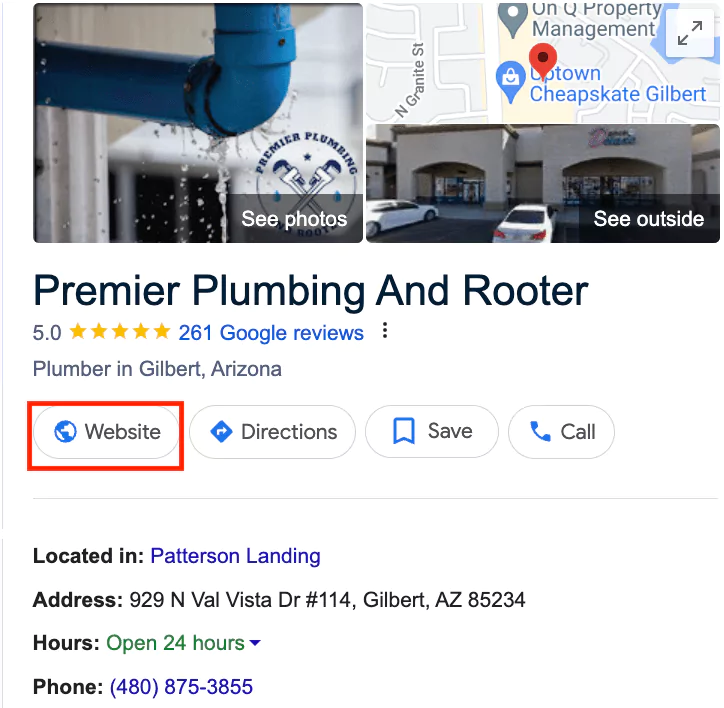
Distance
The distance factor measures the distance of the searcher’s location from your business’s location – which you verify when claiming your Google Business Profile.
You cannot influence the distance factor unless you actually move your business to a new location.
For plumbing companies on the outskirts of cities, considering a business move for SEO purposes is certainly an option.
Relevance
The relevance factor accounts for your Google Business Category (i.e., plumber), business name (i.e., Jim’s Plumbing Experts), and other services listed on your profile and website.
Because your website plays a role, you can influence the relevance factor by showcasing your recent jobs and various services on your website.
For companies considering a name change, including the term plumbing within your LLC can also boost its relevance.
Prominence
The last factor is prominence, which accounts for reviews, years in business, and the popularity of your brand.
For example, nationally recognized plumbing companies like roto-rooter have a built-in prominence associated with their brand.
You can influence your own company’s prominence by requesting customer reviews.
Localized Organic Results
While Google Maps garners about 40% of local search results, the other 60% comes from traditional organic results.
Plumbing websites can create city pages to rank for locations within their service areas.
However, city pages can also damage your SEO if used improperly.
In some cases, city pages violate Google guidelines by serving as something called a doorway page.
A doorway page exists to funnel users into your website under false pretenses.
An example is mass-producing 500 city pages using ChatGPT to change wording.
Google is much smarter than spammers, so they will flag your content as thin.
Ultimately, you will destroy your entire SEO campaign with such a tactic.
Conversely, unique city pages that showcase jobs within that location are perfectly within Google’s guidelines and will rank on Google search in most cases.
Using Software to Enhance SEO
Some software tools can increase search rankings for plumbing companies.
DataPins, NearbyNow, and GeoJuice are all options for showcasing recent plumbing jobs on your website.
I am partial to DataPins, which I invested millions in to develop for local plumbers.
DataPins differs from other tools because it allows plumbers to tag jobs to specific service pages.
For example, if you perform a pipe leak repair in Denver, Colorado, you can tag the job on your pipe leak repair service page and your Denver, CO city page.
Each job is converted into a pin containing schema markup, geo-coordinates, mini-maps, unique photos, and a job description.
Other software tools I recommend are Link Whisper for internal linking and WPRocket for speeding up your site speed.
Optimizing for Google’s AI Overviews
AI’s emergence has already impacted SEO for plumbing contractors, and its influence will continue to grow.
Currently, Google’s AI overviews appear directly on Google SERPs for many plumbing keywords.
Your plumbing company is more likely to appear within these AI overviews when you implement the SEO practices outlined in my formula.
There are additional steps you should also take to maximize your visibility within AI and large language models.
Reach out to the authors who write list articles about plumbers in your primary city and request that your company be added to the list.
Give them specific reasons to include your company, such as a link to your Google reviews or BBB accreditation.
AI models are trained on these list articles (and other internet data) when deciding who to recommend to its users.
Using these techniques will help you not only appear on Google AI overviews but also on ChatGPT, Perplexity, and other AI search engines.

Avoiding SEO Misinformation
In the social media age, anyone can promote themselves as an SEO expert.
That’s why SEO-related misinformation is at an all-time high.
It’s coming from Instagram reels, YouTube shorts, and even blog posts.
In some cases, it’s malicious, but in other cases, these people actually think they are helping local plumbers.
Plumbers must learn how to identify misinformation regardless of the person’s intent.
The first question is whether they have ever run an SEO agency.
If the answer is no, their tactics are rooted in speculation, not practice.
Other examples of SEO misinformation include:
- You can find all your plumbing keywords on Semrush and Ahrefs
- Ranking #1 for plumber + city garners 30% of all clicks
- All blog posts help other pages rank because of “topical authority.”
- Buying backlinks does not violate Google’s guidelines
Acting on these myths would prompt the immediate loss of over half of your prospective customers and potentially cause a manual penalty.
I urge you to review the author’s credentials and research before acting based on their recommendations.
Conclusion
While some SEO components are confusing to plumbers, this guide aims to simplify them so that readers can understand.
When you target the correct terms, create relevant content, and optimize your Google Business Profile, you are already defeating 90% of your competitors.
My SEO for plumbers formula is based on first-hand experience with 1,000+ plumbing campaigns.
My agency has been working with plumbers for over 14 years, and I’ve helped many of them generate millions in revenue.
If you have questions about my process or how it can apply to your campaign, call me directly.



